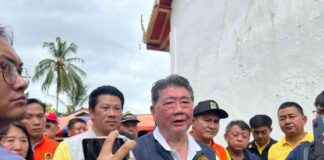Chinese Influence Targeting US Voters Online: Research Findings
A recent study conducted by intelligence company Graphika has shed light on a Chinese social media influence operation that is actively targeting US voters online. This operation, known as “Spamouflage” or “Dragonbridge”, has been identified as a state-linked effort aimed at denigrating US politicians, spreading divisive messages, and impersonating American citizens. With the upcoming presidential election on November 5th, these findings raise concerns about the potential impact of foreign interference on the US political landscape.
Evolution of Spamouflage
Spamouflage has been operating since at least 2017, but its activities have intensified in the lead-up to the election. According to experts, the operation has utilized thousands of accounts across more than 50 websites, forums, and social media platforms to disseminate its messages. Jack Stubbs, who heads Graphika’s research team, highlighted the aggressive nature of Spamouflage’s efforts to infiltrate and influence US political conversations. He emphasized that Chinese influence operations targeting the US are evolving and engaging in more sophisticated deceptive tactics.
One of the key tactics employed by Spamouflage is impersonating American anti-war activists to push its agenda. By creating memes that portray President Trump as a “fraud” and Joe Biden as a “coward”, the operation aims to sow discord and manipulate public opinion. Additionally, Spamouflage has been observed engaging with genuine supporters of former President Trump, indicating a shift in its strategy to target specific segments of the American population.
Response from Chinese Embassy
In response to these findings, Liu Pengyu, a spokesperson for China’s embassy in Washington, denied any intention to interfere in the US election. Pengyu emphasized that China respects the sovereignty of other nations and urged the US not to politicize China’s role in the election. However, the evidence presented by Graphika and other research organizations suggests a concerted effort by Chinese actors to influence American voters through deceptive online tactics.
Platform Responses and Enforcement
Major social media platforms such as Facebook, YouTube, and TikTok have taken action against Spamouflage accounts identified by Graphika. Facebook attributed the campaign to Chinese law enforcement and labeled it as the “largest known cross-platform covert influence operation in the world.” YouTube confirmed that it had terminated a channel associated with Spamouflage for violating its policies on coordinated influence operations. Similarly, TikTok permanently banned the Harlan Report account, one of Spamouflage’s most successful assets, for breaching community guidelines.
Meta, the parent company of Facebook and Instagram, also removed Spamouflage activity from its platforms as part of its ongoing enforcement efforts. Despite these actions, the challenge of combating foreign influence operations remains a significant concern for social media companies and government agencies. The US government has launched investigations into foreign efforts to interfere in the election, with a particular focus on Chinese influence activities.
US Government Response
In a report released by the US Office of the Director of National Intelligence, China was identified as a country that is approaching the US presidential election cautiously. While the report stated that China does not plan to influence the outcome of the election, it highlighted ongoing efforts to influence the US public more broadly. This nuanced approach by China underscores the complexity of foreign interference in the electoral process and the need for heightened vigilance to safeguard democratic institutions.
Implications for US Voters
The prevalence of foreign influence operations targeting US voters online raises critical questions about the integrity of the electoral process. As American citizens navigate a landscape inundated with disinformation and propaganda, it is essential to exercise caution and critical thinking when engaging with political content online. By being vigilant and discerning consumers of information, voters can protect themselves against manipulation and make informed decisions at the ballot box.
Conclusion
The findings from Graphika’s research on Chinese influence targeting US voters online underscore the evolving nature of foreign interference in the US political arena. With the presidential election fast approaching, the need for heightened awareness and proactive measures to combat deceptive tactics has never been more urgent. By staying informed, vigilant, and engaged, American voters can defend against foreign influence and uphold the integrity of the democratic process.




















